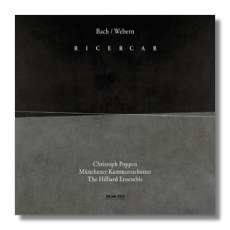
The Internet's Premier Classical Music Source
Related Links
- Latest Reviews
- More Reviews
-
By Composer
-
Collections
DVD & Blu-ray
Books
Concert Reviews
Articles/Interviews
Software
Audio
Search Amazon
Recommended Links
Site News
 CD Review
CD Review
Bach / Webern

Ricercar
- Bach/Webern: Fuga (Ricercata) a 6 voci from "The Musical Offering"
- Johann Sebastian Bach: Cantata #4 "Christ lag in Todesbanden"
- Anton Webern:
- String Quartet (orch. Poppen)
- Five Movements, Op. 5
The Hilliard Ensemble
Munich Chamber Orchestra/Christoph Poppen
ECM New Series 1774 DDD 69:08
This is the kind of CD that only ECM's producer Manfred Eicher could come up with. The juxtaposition of Johann Sebastian Bach and Anton Webern makes sense through the latter's orchestration of the formers famous Ricercar. (The terms "fugue," "ricercata," and "ricercar" are used interchangeably in this context.) Eicher extends the idea in other dimensions, however. As Bach's Ricercar was written early in his career, another early work by Bach, the Cantata #4, has been added to the program. Likewise, Webern's String Quartet and his Five Movements (also originally scored for string quartet) were written when the composer was in his twenties. And, if Webern could orchestrate Bach, then why not let Poppen orchestrate Webern? An additional dimension is provided by works related to the poles of human existence. "In the midst of Life is Death," Eicher seems to be saying by placing "Christ lag in Todenbanden" in the middle of a program otherwise devoted to music written by young composers.
Those aren't the only surprises. Eicher takes a page from Joshua Rifkin in having the Hilliard Ensemble perform Bach's Cantata #4 one voice to a part. The effect is more personal than a traditional choral performance. And Poppen's orchestration of Webern's String Quartet (1905) draws lines between this work and Schoenberg's humidly erotic Verklärte Nacht. One might also mention the "bookending" effect created by having this CD both begin and end with Bach's Ricercar, albeit in two different recordings.
Perhaps there's too much going on here for one CD, but Eicher and his label obviously love to challenge listeners. Even in the Webern, Poppen's interpretive austerity is welcome; in the Bach, the conductor maintains a clear and "authentically" objective style. The musicians of the Munich Chamber Ensemble play in a similarly spare period manner, albeit while using modern instruments. (So many contradictions!) And as expected, the Hilliard Ensemble contributes an absolutely fat-free performance of the cantata – it's cool, but not devoid of expression.
"Ricercar" (as ECM has titled this CD) is what movie producers call "high concept," much like its predecessor "Morimur" – a thesis on Bachian numerology and mortality. It's not heart-warming, but it engages the intellect and sends thought waves off in unusual directions, which is more than one can say about most recent classical CDs. The recording venue was a church in Hamburg; the engineering makes the music come alive without losing it in hall resonance.
Copyright © 2003, Raymond Tuttle


















